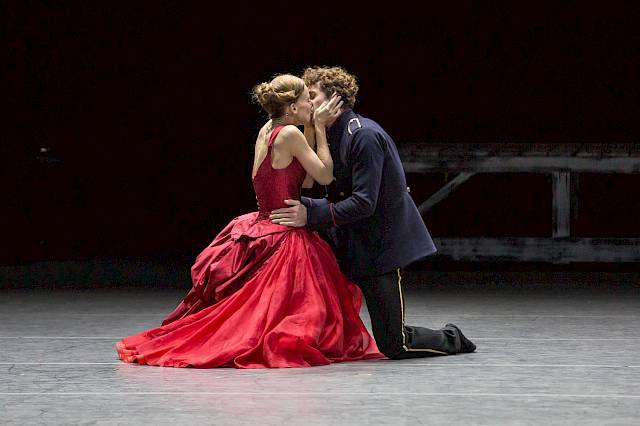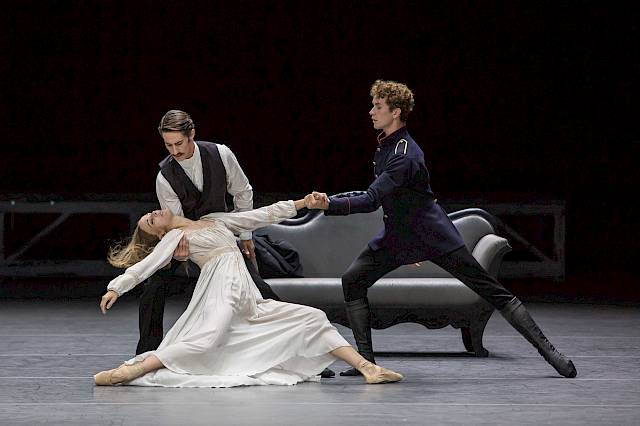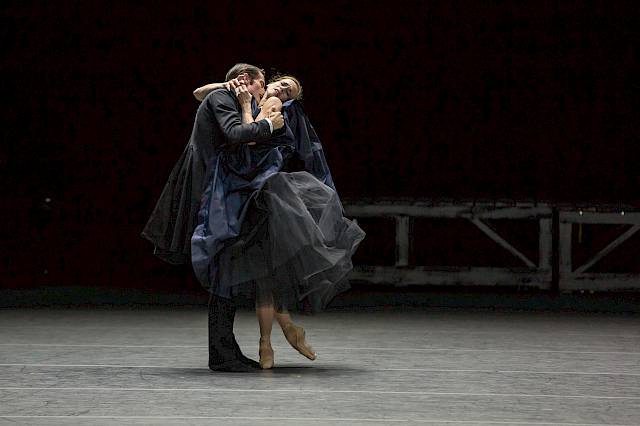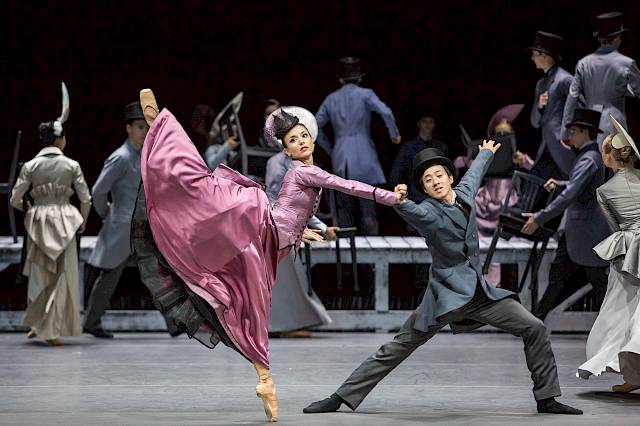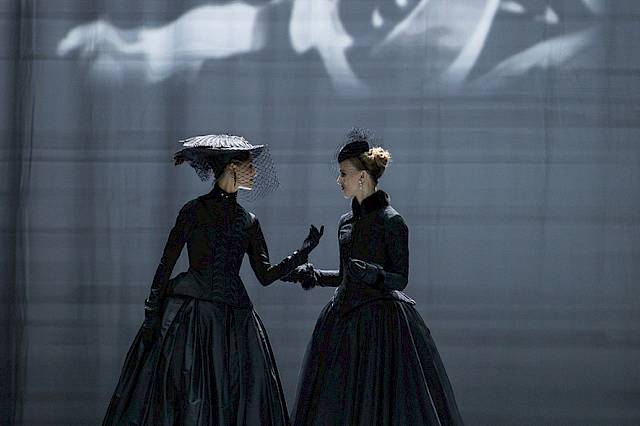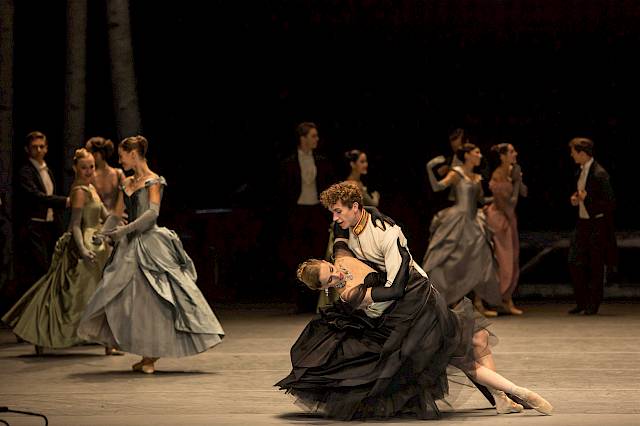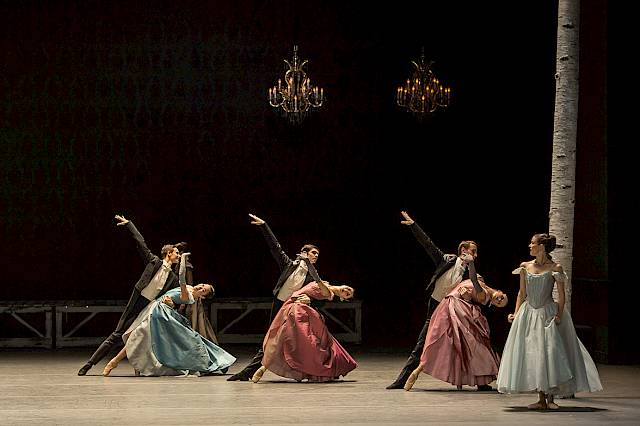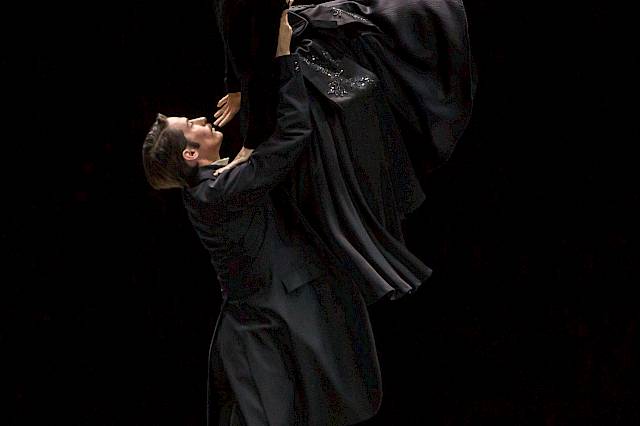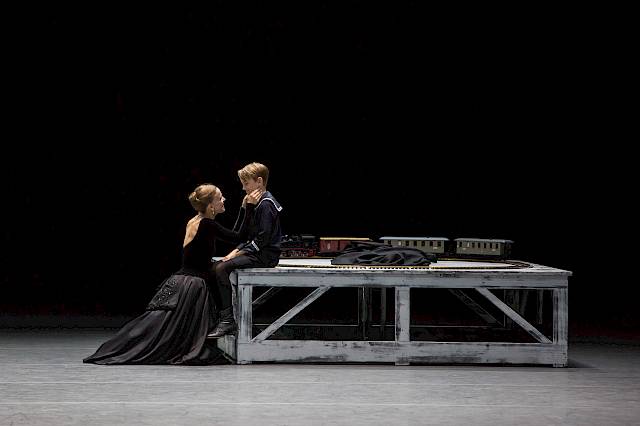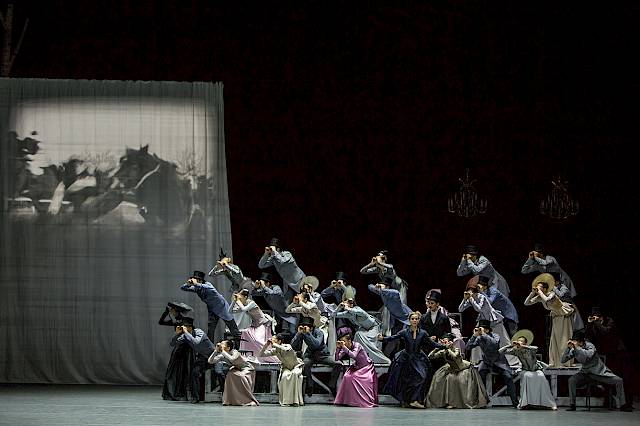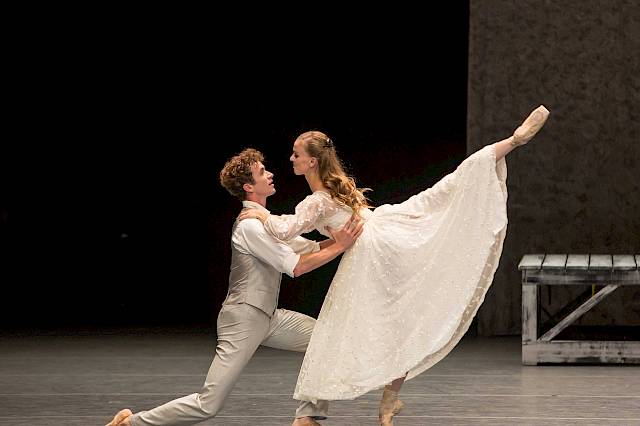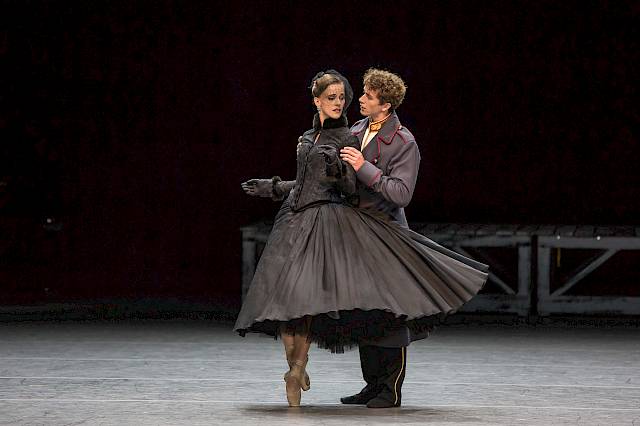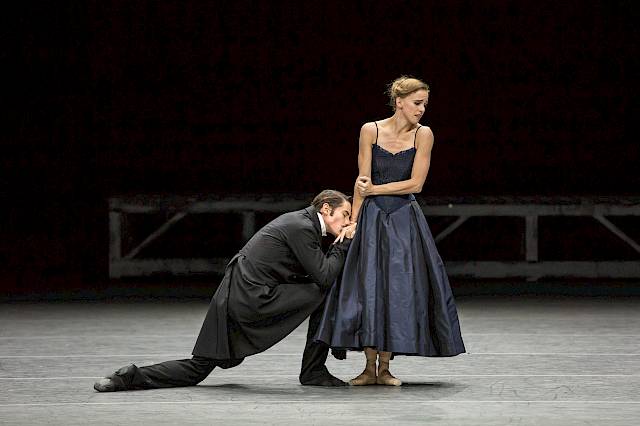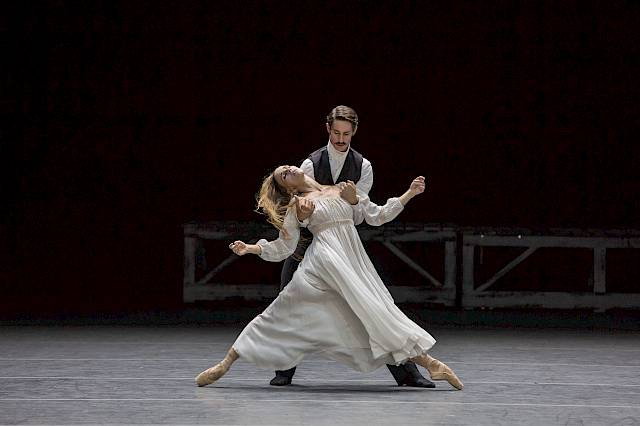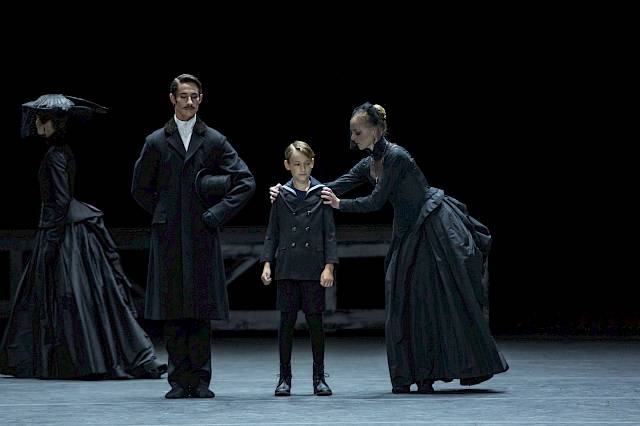Anna Karenina
Ballet by Christian Spuck
After the eponymous novel by Leo Tolstoy (1828-1910)
Music by Sergei Rachmaninoff, Witold Lutosławski, Sulkhan Tsintsadze and Josef Bardanashvili
Duration 2 H. 10 Min. incl. intermission after 1st part after approx. 1 H. Introduction 45 min before the performance.
A co-production with Den Norske Opera & Ballett / Nasjonalballetten, Oslo.
Good to know
Anna Karenina
Synopsis
Anna Karenina
Prologue
Martin Donner: Trains I
Sergei Rachmaninoff: Moment musical op. 16 no. 3 B minor
Salon I
Stiva Oblonski is cheating on his wife Dolly with the female maids. Kitty Shcherbatskaya is being pursued by landowner Konstantin Levin, who has come to town specifically for this purpose.
Sergei Rachmaninoff: Symphonic Dances op. 45,
2. Andante con moto (Tempo di Valse)
Arrival in Moscow
Anna Karenina has come to Moscow from St. Petersburg where she intends to mediate between Stiva and Dolly. Stiva is waiting for Anna on the platform, while her travelling acquaintance, Countess Vronskaya, is being collected by her son Alexei. Anna Karenina and Alexei Vronsky are introduced to one another, and this first sighting remains unforgettable for both.
Witold Lutosławski: Novelette for Orchestra, No. 1 Announcement
The ball
Levin asks for Kitty’s hand in marriage and she turns him down. She is infatuated with Vronsky, and is hoping he will propose to her. However, Vronsky’s only desire is to see Anna Karenina again at the ball. When Anna appears and Vronsky only has eyes for her, Kitty’s world falls apart. Anna realises that she is the reason for Kitty’s destroyed hopes and leaves.
Sergei Rachmaninoff:
Symphonic Dances op. 45, 2. Andante con moto (Tempo di Valse)
To St. Petersburg
Vronsky follows Anna to St. Petersburg. They become closer during the journey. In St. Petersburg, Anna Karenina is collected by her husband Alexei and their son Seryozha.
Sergei Rachmaninoff: Rhapsody on a Theme of Paganini op. 43 for piano and orchestra, Variation 12 Martin Donner: Trains II
In the country I
After his refused proposal, Levin flees to the solitude of his estate and avoids society.
Sergei Rachmaninoff (Arr.: Christophe Barwinek):
Noch' pechal'na, op. 26 No. 12 (The Night is Sad)
Betsy’s salon
The salon of Betsy Tverskaya, a friend of Anna’s, is the meeting point of the decadent Petersburg society. While Dolly and Stiva continue to argue here, Anna and Vronsky enjoy their reunion. When Karenin turns up to collect his wife, she refuses to go home with him. The Karenins are the subject of much discussion in the salon: A shadow has been cast over Anna’s reputation – Vronsky.
As society becomes more distant, Anna and Vronsky’s passion for one another can no longer be assuaged. Vronsky’s love allows Anna to forget the feelings of guilt and shame about the breakdown of her marriage.
Sergei Rachmaninoff: Piano Concert no. 2 c-minor op. 18, 3rd movement
Witold Lutosławski: Chain 3 for Orchestra, III. 38
Horse racing
The distinguished society meets at a horse race, including the Karenins, the Oblonskis, Betsy and Countess Vronskaya. The fact that Anna screams when Vronsky falls with his horse is proof of her unfaithfulness for Karenin and those present. Karenin demands the fulfilment of marital obligations from Anna.
Sergei Rachmaninoff: Rhapsody on a Theme of Paganini op. 43,
Variations no. 8 and no. 9
Witold Lutosławski: Piano concert, 2nd movement
In the country II
Levin takes part in haymaking, forgets his heartache and finds new meaning in life in the shared work with his farmers.
The transformed Kitty comes to the country, and she and Levin become closer to one another.
Martin Donner: Sensen
Sergei Rachmaninoff (Arr.: Christophe Barwinek):
Ne poy, krasavitsa! op. 4 no. 4 (Don’t sing, beautiful)
At the home of the Karenins
After the birth of Vronsky’s daughter, Anna is under threat of death. This situation causes Karenin to forgive her and his love rival. Vronsky, who fears that Anna will return to her husband, attempts suicide.
Sergei Rachmaninoff (Arr.: Christophe Barwinek):
Rhapsody on a Theme of Paganini op. 43, Variation 17
Witold Lutosławski: Piano Concert, 1st Movement
Break
Prelude:
Witold Lutosławski: Novelette for Orchestras, no. 1 Announcement
Italy/Russia
Vronsky is in Italy with Anna. She has left her old life behind - including Seryozha. Vronsky has given up his career in the military for her. They enjoy their abundance of happiness as a pair, but soon Anna misses her son, while Vronsky misses life in society. They return to Russia. Dolly appears to have come to terms with remaining at the side of the notoriously unfaithful Stiva.
Sergei Rachmaninoff: Piano Concert no. 2 c minor op. 18, 2nd Movement
Wedding
Kitty and Levin have come together and marry.
Sulkhan Tsintsadze (Arr.: Christophe Barwinek):
Miniatures for String Quartet, 5th harmony
Seryozha’s birthday
In secret, Anna visits her son Seryozha, who is now being looked after by the confidante of the Karenins, Lidia Ivanovna. They both bring the reunion of mother and son to an abrupt end. Anna and Karenin have a heated discussion, after which Anna remains alone and shattered.
Sergei Rachmaninoff: Prelude C-sharp minor op. 3 no. 2
Loneliness I
Anna is devastated. She now doubts Vronsky’s faithfulness and tries to numb her pain and jealousy with opium.
Sergei Rachmaninoff (Arr.: Christophe Barwinek):
Uvyal tsvetok o. op. (The flower is withered; Text page 74)
Isolation
While Vronsky is able to continue to take part in public life, Anna is perceived as an adulteress and is shunned by and cut off from society. Even her once friend Betsy turns away from her. Her jealousy and delusions turn obsessive, and she suspects that Princess Sorokina, who Countess Vronskaya has chosen for her son, is a love rival.
Witold Lutosławski: Novelette for Orchestra, No. 2 First Event
Witold Lutosławski: Novelette for Orchestra, No. 1 Announcement
Sergei Rachmaninoff: Prelude F-sharp minor op. 23 No.1
Loneliness ll/Anna’s death
All relationships and ties have dissolved for Anna, and Vronsky is also no longer a reason for her to stop. She kills herself.
Josef Bardanashvili: Concerto quasi una fantasia, 2. Sostenuto
Sergei Rachmaninoff: Ne poy, krasavitsa! op. 4 No. 4 (Prelude)


